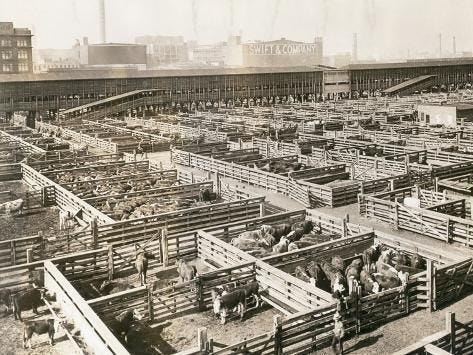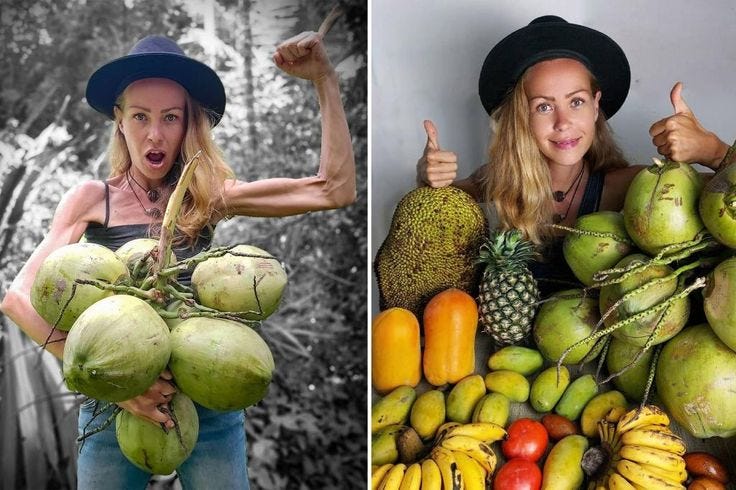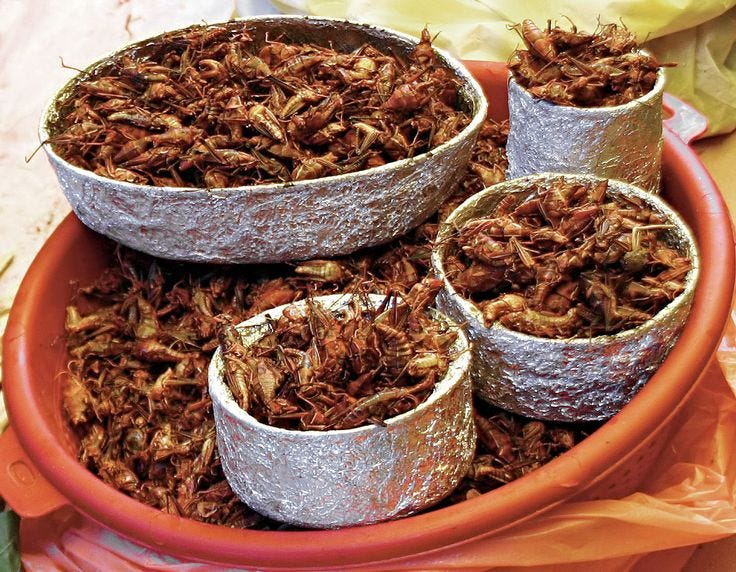Write & Lift is an ethos of personal and spiritual development through conscious physical exertion and practice of the writing craft. Through this effort to strengthen our bodies and minds, we become anti-fragile and self-respecting sovereign individuals. Through this effort, we may stand against untruth and evil and create a new culture of vitality, strength, and virtue.
The Moral Tragedy of Factory Farming
Our dependency on factory farming didn’t happen overnight. In the latter half of the 20th century, we struck a devil’s bargain; a Faustian deal that delivered undeniable benefits. Cheap meat for the masses. Year-round produce regardless of season. Food security at a scale previously unimaginable.
The economic logic is brutally compelling. When you cram 20,000 chickens into a windowless shed, confine 5,000 pigs to concrete pens, or feed cattle a diet they were never meant to digest, you create “efficiencies.” You maximize output while minimizing costs. You turn animals into production units, farmers into corporate employees, and rural communities into economic “zones.”
If your only metric is cost per calorie, the system works. It’s solved genuine problems of hunger and accessibility. It's made animal protein available to income brackets that historically couldn't afford it regularly. For families struggling to make ends meet, Walmart's $1.99/lb chicken thighs represent real economic relief.
But this abundance comes at a devastating price. Factory farming is an affront to God’s creation—a daily desecration of our role as stewards of the land and its creatures. When we reduce living beings to biological machines, confined in spaces where they can barely turn around, never experiencing sunlight or engaging in their natural behaviors, we violate something fundamental in the moral order.
The environmental and health costs are equally catastrophic. Manure lagoons contaminate groundwater. Antibiotic overuse creates resistant superbugs. The food that feeds our food (a concoction of growth hormones, chemically enhanced “protein,” and emulsified slop) would have been unrecognizable to a farmer a century ago. Our health suffers. Our economy suffers. And our souls suffer.
All these externalized costs are conveniently absent from the price tag at the grocery store.
No, We Won’t Eat the Bugs
The typical response to the horrors of factory farming, notably among educated urbanites with disposable income, is simple: stop eating meat altogether. Become vegetarian. Better yet, vegan. Problem solved.
This impulse, while understandable, represents another form of disconnection. It’s a position of moral purity that abandons rather than reforms our relationship with animals and the land. The oft-cited caricature of vegans is truthful: How can you tell whether someone is vegan? Because they tell you... again, and again, and again. And again.
Vegan arguments fall apart quickly. First, they ignore human biology and history. We’ve evolved as omnivores, with digestive systems and nutritional needs that reflect millennia of meat consumption. There are mountains of evidence showing the consequences of abandoning animal consumption entirely: B12 deficiencies, inadequate complete protein sources, diminished zinc and iron absorption, and the challenge of obtaining sufficient omega-3 fatty acids.
I’ve seen many people wither on these restrictive diets, supplementing with industrial food products like soy isolates, pea proteins, lab-created meat substitutes (disgusting), and—the new globe-homo post-scarcity fascination—meals made from ground insects. Yum!
More importantly, veganism abandons rather than reclaims our proper relationship with domestic animals. It says the only ethical choice is to exit the race entirely, leaving the field to the industrial producers. It offers no viable future for the small livestock farmer practicing regenerative agriculture, the rancher using cattle to restore grasslands or the homesteader whose chickens control pests and build soil fertility.
What’s worse, the vegan withdrawal fails on its own terms. The industrial food system adapts, repackages itself, and continues. Almond milk requires massive water inputs and pollination services that kill billions of bees annually. Soybeans for tofu and meat substitutes are grown in monocultures on deforested land. The machines harvesting vegetables kill countless field animals that are conveniently placed on the lowest tier of the vegan moral hierarchy.
There is no pure withdrawal from our relationship with death and life. Everything we eat—plant or animal—comes at some cost to other living beings. Domestic animals deserve a good (and simple) life, and a quick and painless death. Dairy cows do not die lying in a hospital bed surrounded by their loved ones.
The vegan position often stems from the correct moral intuition (horror at animal suffering) but it reaches the wrong conclusion. By completely walking away, they surrender the possibility of reform. Reformation beats dogmatism and engagement beats withdrawal. But like most moral purities, it works better as identity than long term fix.
What if there’s another way?
Downstream From Culture
The philosopher Roger Scruton understood that conserving what’s valuable in our culture requires more than theory. It demands practice and, most importantly, incentives. Our relationship with food is fundamentally cultural rather than economic. When we choose local farms over anonymous supply chains, we’re not just making an environmental choice; we’re rebuilding community bonds and cultural practices that industrial systems have eroded. The human brain, however is terrible at extrapolating the outcomes of daily choices. Most of us would go to the gym if we could live in a body dying of heart disease at 60. The same can be said about our shortsightedness on food production.








